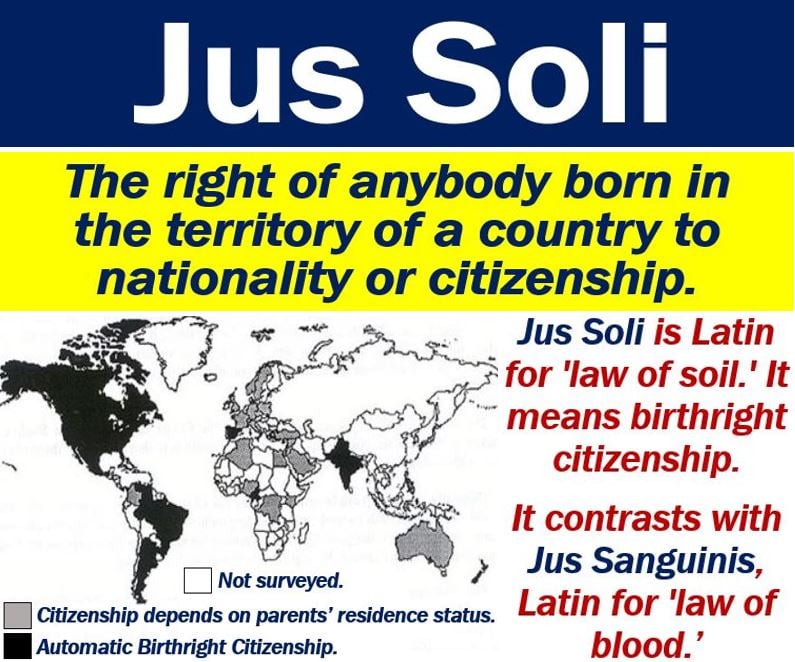Jus soli, Latin for ‘law of soil,’ is a law that states that where we are born determines our citizenship. The legal rule determines that the citizenship of our parents does not determine ours. Jus soli contrasts with jus sanguinis. Jus sanguinis, which means ‘law of blood’ in Latin, states that our ‘blood’ should determine our citizenship. In this context, ‘blood’ means our parents’ citizenship.
There are two ways people spell the term in English: either ‘jus soli’ or ‘jus solis.’ The former is more common.
The United States and Canada follow the juls soli rule. Both countries’ populations mainly consist of immigrants or the offspring of immigrants.
Most other countries, or what we call the ‘old world,’ however, follow the jus sanguini rule.
Jus soli and jus sanguinis
Jus sanguinis derives from Roman law. Roman law dominates the civil-law systems of continental Europe. Jus soli was once part of English common law.

Jus soli – birthright citizenship
We use the English term ‘birthright citizenship’ with the meaning of jus soli.
Apart from the US and Canada, many other countries also follow the birthright citizenship system.
Every country in North and South America (except for Colombia), plus Pakistan, Lesotho, and Tanzania have ‘unrestricted’ jus soli.
The United Kingdom and Ireland, however, changed their laws in 1983 and 2005 respectively. Now, at least one parent must be a British/Irish citizen by the time the person is ten years old. Also, if one parent is legally ‘settled’ in the country, the person may become a British/Irish citizen.
Australia changed its law in 1986, and today has a similar system to that of the UK and Ireland.
Since Ireland changed its law, no European country today grants birthright citizenship.
Brexit
In 2016, the United Kingdom had a referendum regarding its membership of the European Union (EU). People voted for Brexit, which stands for BRitain EXITing the EU.
One of the main reasons for wanting to leave was immigration. Many Britons felt that the UK, a relatively small country geographically, needed to regain control of its borders.
In other words, Britons wanted to decide who entered the country and who could work, become a resident, or become a citizen.
Convention on the Reduction of Statelessness
The Convention on the Reduction of Statelessness is a UN multilateral treaty that countries signed in 1961. The UK, Ireland, Australia, New Zealand, and Canada signed the Treaty. However, the US did not.
The Treaty aimed to reduce the incidence of statelessness. Countries that signed the Treaty will grant nationality to a stateless person if they were born in their territory.
They will also grant nationality if somebody was born in a ship or airplane that is traveling under their flag.
